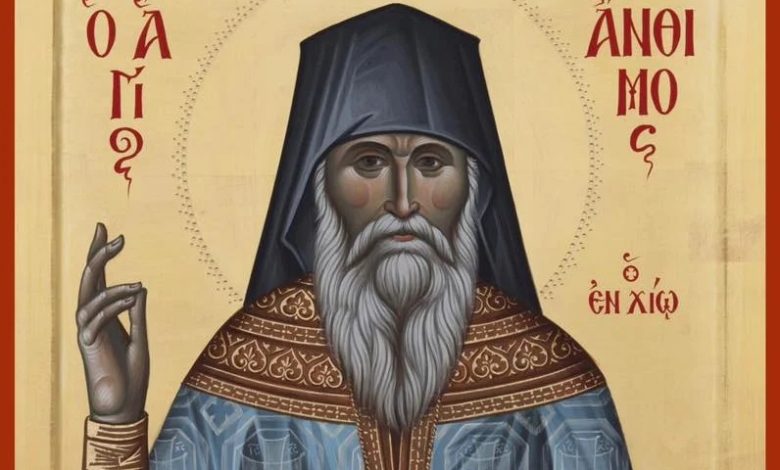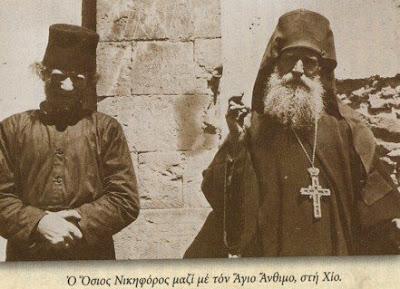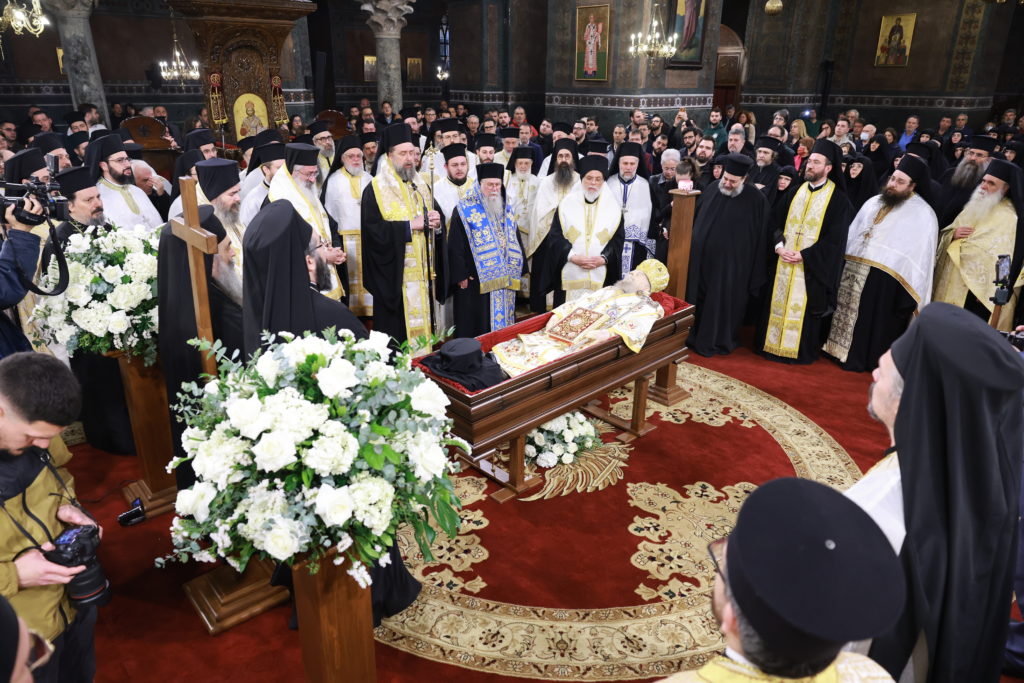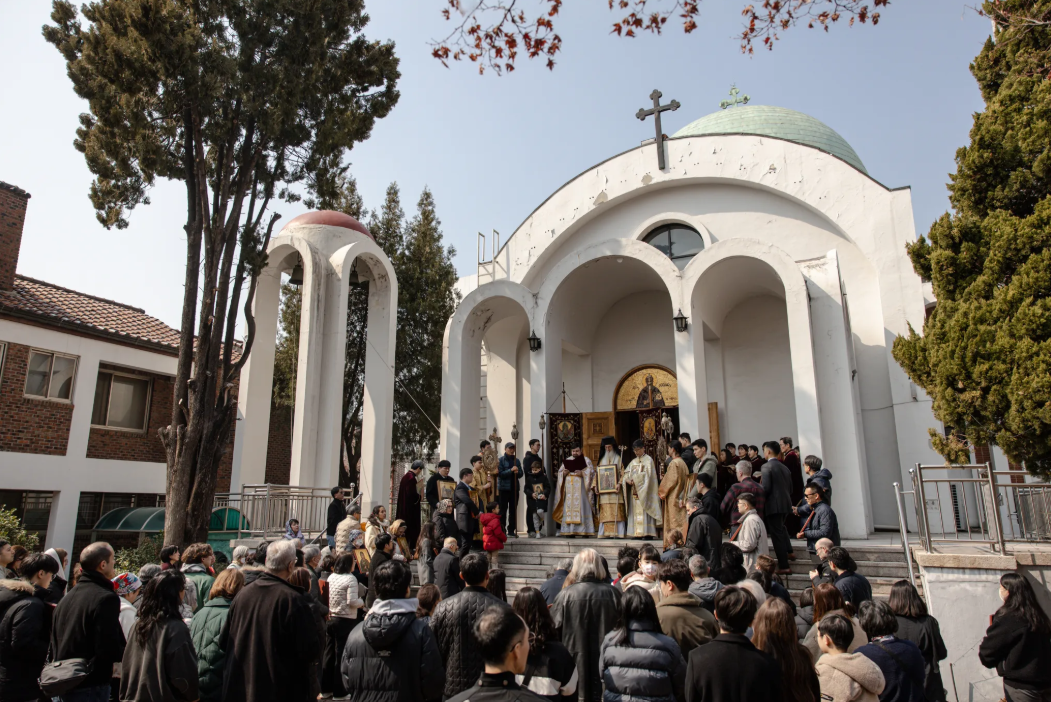St. Anthimos of Chios (February 15)

St. Anthimos, who in the world was known as Argyrios K. Vagianos, was born on July 1, 1869 to devout peasants, Konstantinos and Argyra, in Chios, in the region of Agios Loukas Leivadion. He left elementary school early to become a shoe mender. At the age of nineteen he visited the Skete of the Holy Fathers founded by the monk Pachomios, who had been the spiritual counselor of St. Nektarios. With the blessing of the elder, Anthimos returned home and built himself a small hut and dwelt in it. His only help in his spiritual contests was an icon of the Mother of God given to him by his mother later known as Panagia Voithia (the Helper), which soon began to work miracles, drawing many to his hermitage.

He had returned home to relieve the suffering of his parents and help the poor of his village as well. After a time he retired to the Skete of the Holy Fathers, and it was here that he became a Small Schema monk and took the name Anthimos given by Elder Pachomios. After this he was put in charge of building the Convent of Saint Constantine. However, he soon fell ill and his abbot sent him home to his parents for the sake of his health.
At home, despite the fact that he was caring for his aged parents and practicing his shoe mender’s trade, he continued to live as a monk, spending nights on end in prayer and sometimes living only on bread and water for extended periods every two days. “Not even for a minute,” he said later, did he give himself rest, and even spent nineteen nights awake in prayer. He took his inspiration reading about the lives of the great ascetics, and in this way he was able to conquer every assault of the devil. At the end of his feat, he was rapt in ecstasy and his spirit was carried up into paradise amid the angelic choirs, while he repeated without ceasing: “Lord have mercy.”
Increasing numbers of visitors came to his hermitage and wonderworking icon of the Theotokos, and in 1909, at the age of forty, he received the Great Schema by the successor of Pachomios, Hieromonk Andronikos. The people of Chios wanted him to be ordained to the priesthood, but his bishop refused due to the Saint’s lack of education. At the prompting of Anthimos’ godfather, the Bishop of Smyrna ordained him instead in 1910. At the moment of his ordination there was an earth tremor, accompanied lightning and claps of thunder.

Since his virtues and miracles provoked the jealousy of certain priests, he left the region. After a pilgrimage to Mount Athos in 1911, he returned to Chios, where he became chaplain to a leper hospital. Soon the hospital, which had fallen into spiritual corruption, became a spiritual center, as much like a monastery as a hospital. Saint Anthimos tended many of the sickest with his own hands, working many miracles of healing; some of his recovered patients became monks or nuns (such as Venerable Nikephoros the Blind). Thirty-eight people were freed of evil spirits through his fasts and his prayers before the icon of the Mother of God.
With the notorious ‘Exchange of Populations’ of 1922-1924, refugees poured into Chios, many of them destitute nuns and girls. Ever since his youth, St. Anthimos had dreamed of founding a monastery on a certain steep uninhabited site that he knew of. Now, in response to a vision of the Mother of God, St. Anthimos received permission to found a monastery there in 1927, and he confirmed this by drawing lots three times following the Divine Liturgy. He built the monastery in 1930, which opened with thirty nuns and grew rapidly, despite the opposition of many who said that setting up such a community was out of date.
The Monastery of Panagia Voithia, as it came to be known, soon housed eighty nuns and was known throughout Greece as a model of monastic life. Father Anthimos served as priest to the nuns, and continued to receive the many faithful — often sixty or seventy per day — who came to him for prayer or counsel. He carried on this ministry for more than thirty years, working many miracles of healing. When he was too old to work with his hands, he retired to his cell and prayed that he be enabled to serve his neighbor until his last breath.
On January 27, 1960 St. Anthimos celebrated his final Divine Liturgy. He reposed in peace at the age of ninety-one on February 15th, mourned and revered by the whole island of Chios. The remains of St. Anthimos are in the church inside of the monastery he founded and still work miracles along with the holy icon of Panagia Voithia. He was canonized by the Ecumenical Patriarchate on August 13, 1992.

Sayings
– “Humble-mindedness will bring all the virtues.”
– “What do people do when their hands and faces are dirty? They turn on a tap and allow the water to clean away the stains. We should imitate them. Only, we should open two taps – our eyes, so that an abundance of tears of repentance pour out, which will wash out all the poisons of this futile world which have infected and dirtied our wretched souls.”
– “The Panagia is the only mother of all Christians. And who does not call upon her? Because the sufferings of mankind are many in this vain world, nowhere else can we all find relief, except in the Panagia. When you are sitting there quietly, a thought suddenly comes to you and brings darkness. Where will you go to be loosed from this darkness? To the Panagia. All the Saints are our helpers, but above all is the Panagia.
She has the riches of great compassion. She has great love for mankind, especially for sinners. For this reason she never ceases to mediate to her Son, and the Son takes great joy when His mother intercedes on behalf of mankind. For this reason she brought us His mother and granted her to us that we may have her as a source of salvation.”
Apolytikion in the Third Tone
O new boast of Orthodoxy, and newly-adorned flower of purity, you shared the name of Anthimos of Nikomedia, and shared his virtues and way of life, O new seal and adornment of the venerable ones. O Father Anthimos, the boast of all Chios, entreat Christ God to grant us great mercy.
Source: johnsanidopoulos.com





